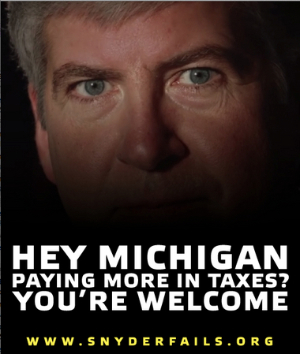
Republicans and their friends in the media keep squinting at the horizon hoping to see a GOP wave forming for November’s elections. Their biggest argument for it is that it should be coming.
“This year, Republicans should do not only well, but very well,” wrote The Weekly Standard’s Jay Cost, one of the many right-wing pundits who predicted Mitt Romney’s victory. “If they don’t, it will be the surest sign yet that something is very wrong with the Grand Old Party.”
President Obama’s unfavorable rating is about 10 percent higher than his approval, which is a tiny gulf compared to the Congressional Republicans’ more than 30 percent popularity deficit. Still, the right sees the president’s low numbers as an indication that the public has adopted its view that the president has not cleaned up George W. Bush’s steaming messes at home and abroad properly.
They see a wave — because the thought of not seeing a wave is unbearable.
Of course, there’s no need for a wave for the GOP to take the Senate as they only need to win seats in states Romney won — Alaska, Arkansas, Louisiana, North Carolina, South Dakota and West Virginia — to take control of the House.
As of early September, they either have about a 63.5 percent, 58 percent or a 25 percent chance of pulling off this very unimpressive task.
There’s no evidence of any wave forming — though Republicans would like to see it in defensive actions like the president delaying action on immigration until after the election. Democrats have a slight lead in the generic ballot and Republicans are generally under-performing in redder states, especially Alaska and North Carolina. All of the factors that fed the 2010 wave continue to shift away from Republicans.
Regardless, the real question of whether there will be a GOP wave or not will not be settled in red states — but in blue states that tend to go purple in non-presidential years.
“Republicans have everything going for them in 2014,” Cook Political Report‘s Amy Walter wrote. “If the combination of a great environment, lower turn-out, and good candidates can’t get them to victory in swing states like Colorado or Iowa, it doesn’t bode well for a GOP presidential candidate in 2016.”
To see a GOP wave forming, you have to ignore that GOP governors who won in blue states in 2010 are struggling this year — including former GOP presidential contender Scott Walker. And you have to completely ignore what’s going on in Michigan.
As HealthCare.gov struggled, Republican Senate candidate Terri Lynn Land briefly took the lead to replace Senator Carl Levin. Since ads connecting her to the Koch brothers appeared and Land’s inability to answer questions in public became clear, Land has fumbled from issue to issue since Medicaid expansion began in the state and enrollments are nearing 400,000. That race has mostly disappeared from the Senate conversation — with the Koch-backed Freedom Partners group recently canceling ads in the state.
Republican incumbent Rick Snyder is a hero of business Republicans nationwide and was supposed to cruise to re-election.
It wasn’t supposed to be this close! Detroit News‘ Nolan Finley whined a month ago, before Democratic Mark Schauer scored his first lead in the polls.
Snyder ran by mentioning his nerdhood more than his party identification but his record betrays him, which is why he feels the need to not tell the truth about it.
His attacks on labor went further than Scott Walker’s, he raised taxes on 51 percent of the state to pay for tax cuts for business and has cut education by at least half a billion dollars, depending on how you do the math. If he’d done all this and delivered some results, he’d likely be doing much better in polls.
Instead, Michigan’s unemployment rate is the third worst in the nation and Snyder has been reduced to telling people they’re going to feel the recovery — one day.
Snyder had benefited greatly from Democratic policies — especially rescuing the auto industry and expanding Medicaid. His chief accomplishment is not obstructing the Affordable Care Act. But voters seem to be increasingly sure the state would have been in a lot better shape if we hadn’t taken a right turn in 2010.
This is the crux of why there is no red wave forming in blue states.
Michigan’s Democratic Party knows why it lost in 2010 — a million Democrats stayed home. Both parties have invested heavily in outreach for the state. The state-wide elections are still within or close to most polls’ margin of error. So the result, as always, will come down to who gets their voters out. But the GOP advantage of 2010 is gone.
Republicans won by running against an economy Democrats inherited. But Republicans no longer have the chance to campaign against a fantasy of how they would change things. They had a chance to prove they had better ideas. But in states that don’t have tons of oil, they’ve proven their economic ideas are better for creating crises than fixing them.



